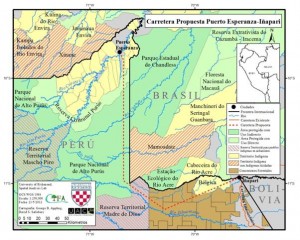
A controversial plan to build a highway deep in Peru’s south-eastern Amazon jungle region is being strongly opposed by the Environment Ministry’s parks service.
In a statement on Tuesday, the parks service, Sernanp, said the project would “violate the intangibility and integrity of two national protected areas: the Communal Purus Reserve and the Alto Purus National Park.”
Both areas were created more than 10 years ago by the government, and include indigenous groups that live in voluntary isolation, including the Mashco, Mascho-Piros and Curanjeños.
In January, Peruvian Times began to receive hundreds of signatures on an open letter, generated by the Rainforest Portal, addressed to President Humala calling to cancel the road project.
The road plan is being promoted in Congress by legislator Carlos Arias of the opposition Fuerza 2011 party.
The bill aims to declare a “national interest and public necessity” the construction of a road or railway between the towns of Puerto Esperanza, in the Ucayali region’s Purus province, to Iñapari, in the province of Madre de Dios. The proposed route for the highway or rail line, parallel to the border with Brazil, would cut through both national protected areas.
Proponents say that the project is needed in order to open up the isolated jungle area and provide a better connection to local communities. However, opponents say that it will do no more than destroy delicate rainforest ecosystems, violate the rights of indigenous people and facilitate illicit activities that include drug trafficking, illegal logging and informal gold mining.
“There is no doubt that a highway between Iñapari and Purus would be the end of the [national] park, the uncontacted Indians, of its marvelous biological diversity and of its tremendous economic potential for tourism,” said well-known forestry expert and environmentalist Marc Dourojeanni.
Indigenous leader Julio Cusurichi said the highway would lead to “ethnocide” of the uncontacted Indians.
“What they are planning is contradictory,” he added in an interview with Inforegion. “While in Madre de Dios they lack resources to fix existing highways and roads in our communities, they are planning to move ahead quickly with a highway that would only support illegal logging and allow the violation of intangible zones.”





